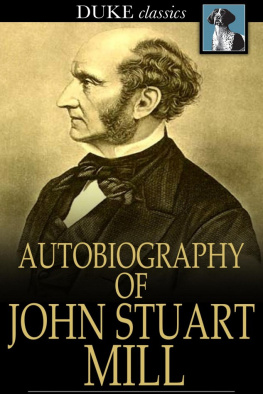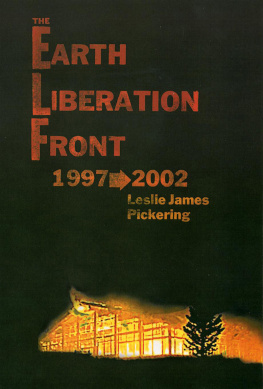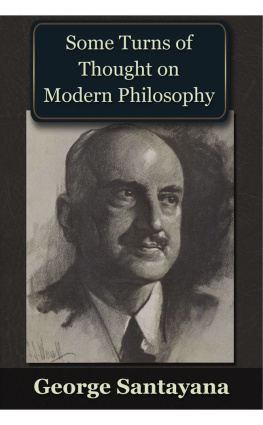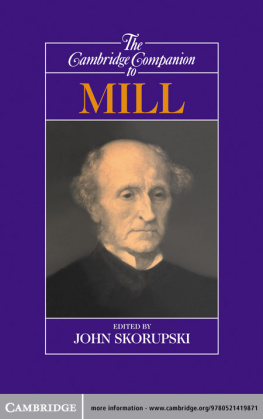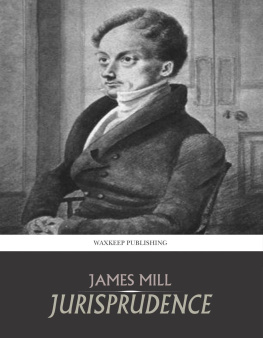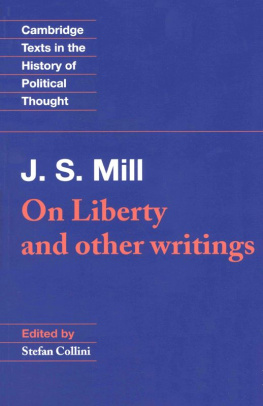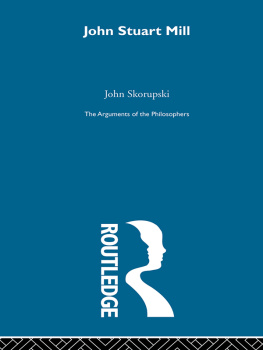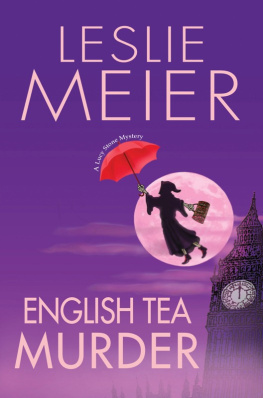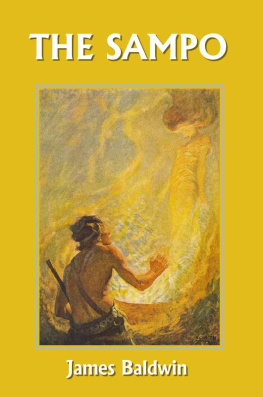The Project Gutenberg eBook, The English Utilitarians, Volume II (of 3), by Leslie Stephen
This eBook is for the use of anyone anywhere at no cost and with
almost no restrictions whatsoever. You may copy it, give it away or
re-use it under the terms of the Project Gutenberg License included
with this eBook or online at www.gutenberg.org
Title: The English Utilitarians, Volume II (of 3)
James Mill
Author: Leslie Stephen
Release Date: June 14, 2008 [eBook #25788]
Language: English
Character set encoding: ISO-8859-1
***START OF THE PROJECT GUTENBERG EBOOK THE ENGLISH UTILITARIANS, VOLUME II (OF 3)***
E-text prepared by Stacy Brown, Thierry Alberto, Henry Craig,
and the Project Gutenberg Online Distributed Proofreading Team
(http://www.pgdp.net)
THE ENGLISH UTILITARIANS
By LESLIE STEPHEN
IN THREE VOLUMES
VOL. II
JAMES MILL
LONDON
DUCKWORTH and CO.
3 HENRIETTA STREET, W.C.
1900
CONTENTS
| CHAPTER I |
| JAMES MILL |
| I. Early Life, |
| II. Bentham's Lieutenant, |
| III. Leader of the Utilitarians, |
| CHAPTER II |
| REFORM MOVEMENTS |
| I. Political Change, |
| II. Law Reform, |
| III. Economic Reform, |
| IV. Church Reform, |
| V. Sinister Interests, |
| CHAPTER III |
| POLITICAL THEORY |
| I. Mill on Government, |
| II. Whiggism, |
| III. Conservatism, |
| IV. Socialism, |
| CHAPTER IV |
| MALTHUS |
| I. Malthus's Starting-point, |
| II. The Ratios, |
| III. Moral Restraint, |
| IV. Social Remedies, |
| V. Political Application, |
| VI. Rent, |
| CHAPTER V |
| RICARDO |
| I. Ricardo's Starting-point, |
| II. The Distribution Problem, |
| III. Value and Labour, |
| IV. The Classical Political Economy, |
| V. The Ricardians, |
| CHAPTER VI |
| ECONOMIC HERETICS |
| I. The Malthusian Controversy, |
| II. Socialism, |
| CHAPTER VII |
| PSYCHOLOGY |
| I. Thomas Brown, |
| II. James Mill's Analysis, |
| III. James Mill's Ethics, |
| CHAPTER VIII |
| RELIGION |
| I. Philip Beauchamp, |
| II. Contemporary Thought, |
CHAPTER I
JAMES MILL
I. EARLY LIFE
Bentham's mantle fell upon James Mill.[1] Mill expounded in the tersest form the doctrines which in Bentham's hands spread into endless ramifications and lost themselves in minute details. Mill became the leader of Bentham's bodyguard; or, rather, the mediator between the prophet in his 'hermitage' and the missionaries who were actively engaged on the hustings and in committee-rooms. The special characteristics of English Utilitarianism in the period of its greatest activity were thus more affected by Mill than by any other leader of opinion.
James Mill was one of the countless Scots who, having been trained at home in strict frugality and stern Puritanic principles, have fought their way to success in England. He was born 6th April 1773 in the parish of Logie Pert, Forfarshire. His father, also named James Mill, was a village shoemaker, employing two or three journeymen when at the height of his prosperity. His mother, Isabel Fenton, daughter of a farmer, had been a servant in Edinburgh. Her family had some claims to superior gentility; she was fastidious, delicate in frame, and accused of pride by her neighbours. She resolved to bring up James, her eldest son, to be a gentleman, which practically meant to be a minister. He probably showed early promise of intellectual superiority. He received the usual training at the parish school, and was then sent to the Montrose Academy, where he was the school-fellow and friend of a younger lad, Joseph Hume (1777-1855), afterwards his political ally. He boarded with a Montrose shopkeeper for 2s. 6d. a week, and remained at the Academy till he was seventeen. He was never put to work in his father's shop, and devoted himself entirely to study. The usual age for beginning to attend a Scottish university was thirteen or fourteen; and it would have been the normal course for a lad in Mill's position to be sent at that age to Aberdeen. Mill's education was prolonged by a connection which was of great service to him. Sir John Stuart (previously Belches), of Fettercairn House, in Mill's neighbourhood, had married Lady Jane Leslie, and was by her father of an only child, Wilhelmina. Lady Jane was given to charity, and had set up a fund to educate promising lads for the ministry. Mill was probably recommended to her by the parish minister, as likely to do credit to her patronage. He also acted as tutor to Wilhelmina, who afterwards became the object of Scott's early passion. Mill spent much time at Fettercairn House, and appears to have won the warm regards both of the Stuarts and of their daughter, who spoke of him affectionately 'with almost her last breath.'[2] The Stuarts passed their winters at Edinburgh, whither Mill accompanied them. He entered the university in 1790, and seems to have applied himself chiefly to Greek and to philosophy. He became so good a Greek scholar that long afterwards (1818) he had some thoughts of standing for the Greek chair at Glasgow.[3] He was always a keen student of Plato. He read the ordinary Scottish authorities, and attended the lectures of Dugald Stewart. Besides reading Rousseau, he studied Massillon, probably with a view to his future performances in the pulpit. Massillon might be suggested to him by quotations in Adam Smith's Moral Sentiments. There are few records of acquaintanceship with any of his distinguished contemporaries, except the chemist Thomas Thomson, who became a lifelong friend. He probably made acquaintance with Brougham, and may have known Jeffrey; but he was not a member of the Speculative Society, joined by most young men of promise.
In 1794 he began his course of divinity, and on 4th October 1798 was licensed to preach. He lived in his father's house, where part of the family room was screened off to form a study for him. He delivered some sermons, apparently with little success. He failed to obtain a call from any parish; and there are vague reports of his acting as tutor in some families, and of a rebuff received at the table of the marquis of Tweeddale, father of one of his pupils, which made him resolve to seek for independence by a different career.
In 1802 Mill went to London in company with Sir John Stuart, who was about to take his seat in parliament. Stuart procured admission for him to the gallery of the House of Commons, where he attended many debates, and acquired an interest in politics. His ambition, however, depended upon his pen; and at first, it would seem, he was not more particular than other journalists as to the politics of the papers to which he contributed. He had obtained a testimonial from Thomson, on the strength of which he introduced himself to John Gifford, editor of the Anti-Jacobin Review.[4] This was a monthly magazine, which had adopted the name and politics of the deceased Anti-Jacobin, edited by William Gifford. Mill obtained employment, and wrote articles implying an interest in the philosophy, and especially in the political economy, of the time. It is noteworthy, considering his later principles, that he should at this time have taken part in a strong Tory organ. He wrote a pamphlet in 1804 (the first publication under his name) to prove the impolicy of a bounty upon the exportation of grain; and in 1807 replied in



